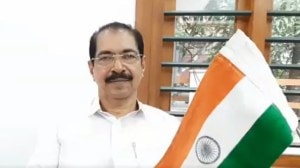Pandharpur Temples Act doesn’t affect anyone’s religious rights, two temples open to all faiths: Maharashtra to HC
The government says the 1973 law was enacted to safeguard the interests of the temples and 'relieve devotees from the rapacity of the priestly classes'.
 Through the Pandharpur Temples Act 1973, the government had abolished all hereditary rights and privileges of ministrants and priests for the governance and administration of the temples of Lord Vitthal and Rukmini in Pandharpur. It enabled the government to control its administration and management of funds. (File)
Through the Pandharpur Temples Act 1973, the government had abolished all hereditary rights and privileges of ministrants and priests for the governance and administration of the temples of Lord Vitthal and Rukmini in Pandharpur. It enabled the government to control its administration and management of funds. (File) The Maharashtra government has informed the Bombay High Court that the Vitthal and Rukmini temples in Solapur are open to people of all faiths and that the Pandharpur Temples Act of 1973, under which the government took over their administration, does not impair any devotee’s rights.
The government was responding to a PIL petition filed by BJP leader Subramanian Swamy challenging the Act. It submitted that the law was enacted under special circumstances to safeguard the interests of the temples and to “relieve devotees from the rapacity of the priestly classes”.
On August 21, a bench of Chief Justice Devendra Kumar Upadhyaya and Justice Arif S Doctor directed the state government to file its reply to Swamy’s petition, which claimed that the government had taken over the administration of the town’s temples perpetually in an arbitrary manner.
Through the Pandharpur Temples Act 1973, the government had abolished all hereditary rights and privileges of ministrants and priests for the governance and administration of the temples of Lord Vitthal and Rukmini in Pandharpur. It enabled the government to control its administration and management of funds.
The petition stated that the government, by taking control over the Pandharpur temples, has curtailed Hindus’ rights to profess, practise and propagate their religion and to manage the religious endowments and their affairs in matters of faith.
Following complaints of exploitation and misbehaviour by priests, the government in October 1968 appointed a commission of inquiry under a retired district judge to inquire into the alleged mismanagement of Pandharpur temples. The commission in 1970 recommended certain changes, after which the law was passed by the legislature in 1973, according to the government’s affidavit submitted in the court.
The state also submitted that the Act’s provisions had been upheld by trial courts, an appellate court, the high court and the Supreme Court after they were challenged by priests.
The affidavit, filed by K H Patil, deputy secretary in the law and judiciary department, stated, “The Pandharpur temples occupy a unique position in the state having national importance. The Pandharpur temples are considered as public temples open to all persons abiding to different faiths and philosophies and have been found to not be religious denominational institutions, as mentioned in the commission of inquiry.”
“The impugned Act was introduced in the interest of the general public and intended to bring about changes in economic, financial, political or other secular activities as well as providing for social welfare and reform associated with religious practice. The Act did not affect any protected religious right guaranteed to any pilgrim or devotee and safeguarded the performance of religious rites and observance of religious practices in accordance with the prevailing traditional usage and custom,” the affidavit further said.
It went on to add, “It is evident from the historical context that there were special circumstances prevailing in relation to the Pandharpur temples, which occupied a unique position in the state, necessitating action on the part of the state to safeguard the interests of temples, its properties and endowment and the multitude of devotees and pilgrims so as to relieve them from the rapacity of the priestly classes.”
Seeking dismissal of the petition, the government submitted that the Act “does not impair or curtail” the rights of the devotees or pilgrims to profess, practise or propagate religion, as recognised under Article 25 of the Constitution, and is not violative of their fundamental rights.
The high court will hear the PIL petition on September 13.







